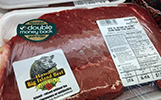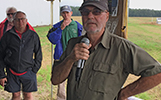| A Call for Transparency 
Greg Henderson, Drovers | September 21, 2017
The long process to create a Canadian ‘sustainable beef' program is nearing the finish line.
It's music to a cowboy's ears when a meat company CEO says, "Meat demand is growing rapidly around the world. We want the world to keep eating what it loves."
Those are the words of Uma Valeti, co–founder and CEO of Memphis Meats, a San Leandro, Calif.–based startup developing technology to grow meat from self–reproducing animal cells. That's right, lab meat—the futuristic product that combines all of your calf–pulling, hay baling, fence–fixing labor into a stainless–steel cultivator dish.
After touting the robust demand for meat, Valeti says, "However, the way conventional meat is produced today creates challenges for the environment, animal welfare and human health."
Beef Cattle Contribute to Sustainable Food System
Hoosier Ag Today | September 19, 2017
A recent study by the United Nations' Food and Agriculture Organization says cattle raised for beef production play a key role in maintaining a sustainable food system. Meat industry publication, Meatingplace, reports that the research essentially counters claims that beef production consumes too much human–edible feed, finding that cattle are net contributors to the global protein supply, and concludes that "modest yield improvements" can reduce further land expansion for feed production. The research shows that 86 percent of the feed cattle consume is grasses grown on marginal lands, not edible to humans.
There's Lots of Money Being Left On the Packing Plant Floor
Alexis Kienlen, Alberta Farmer | September 19, 2017
National Beef Quality audits prove that Canadian beef is pretty darn good.
But they also show that producers could be putting more money in their wallets by reducing defects that show up at the packing plant, says Mark Klassen, director of technical services with the Canadian Cattlemen's Association. The last audit, conducted in 2010–11, found that quality defects added up to $61.80 per head.
"It's a significant loss of money. Ultimately these costs impact the entire supply chain, but it's often producers in particular," said Klassen. A new audit is currently underway and full results won't be ready until next year.
Degraded Soils Cost Farmers Billions Annually 
Laura Rance, Manitoba Co–operator | September 19, 2017
Farmers have reduced the amount of soil they lose through annual cropping practices, but they continue to carry a costly legacy of degraded soils, a University of Manitoba soil scientist says.
David Lobb used crop production data and computer models to estimate how much lost productivity has occurred over the past four decades due to soil erosion. The numbers he came up with were startling.
A Few Of The Bright Spots At Climate Week So Far
Steve Zwick, Ecosystem Marketplace | September 23, 2017
The energy sector generates about 70 percent of all man–caused greenhouse–gas emissions, but the other 30 percent – and maybe much, much more – comes from the way we manage our forests, farms, and fields.
Restaurants Make Gains in Antibiotic–Free Chicken, But Not On Beef, Pork 
Samantha Bomkamp, Chicago Tribune | September 27, 2017
"When it comes to chicken nuggets, we've seen incredible change in a few short years — but burgers and bacon are another story," said Lena Brook, food policy advocate at the Natural Resources Defense Council. "To keep our life–saving antibiotics working when people need them, the entire meat industry — beef and pork included — must start using them responsibly."
Surprisingly, Tropical Forests Are Not a Carbon Sink
Adam Aton, Scientific American | September 29, 2017
Tropical forests are adding more carbon dioxide to the atmosphere than they're removing, according to a new study that estimates the world's lush canopies emit more CO2 than all of America's cars and trucks.
The silver lining, the researchers say, is that tropical forests have untapped potential to act as carbon sinks through better conservation and land management. | |
